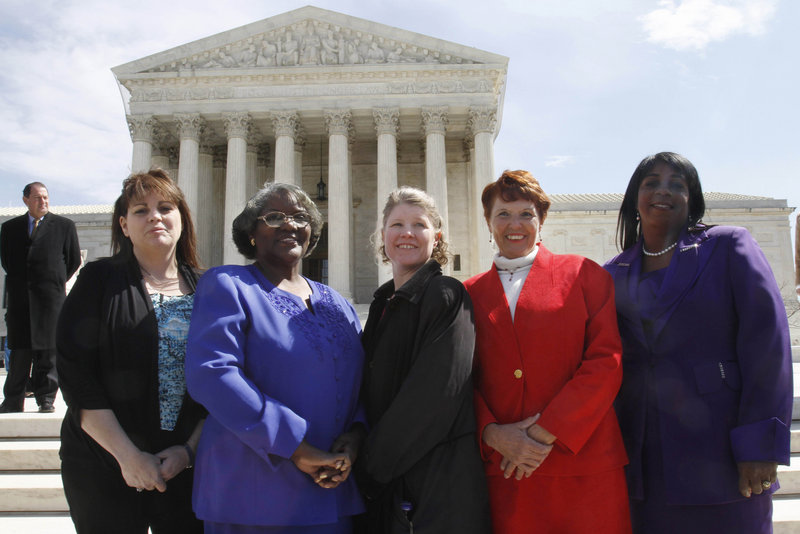WASHINGTON — The Supreme Court blocked the largest sex-discrimination lawsuit in U.S. history on Monday, siding with Walmart and against up to 1.6 million female workers in a decision that makes it harder to mount large-scale bias claims against the nation’s other huge companies, too.
The justices all agreed that the lawsuit against Walmart Stores Inc. could not proceed as a class action in its current form, reversing a decision by the 9th U.S. Circuit Court of Appeals in San Francisco. By a 5-4 vote along ideological lines, the court also said there were too many women in too many jobs at Walmart to wrap into one lawsuit.
A class action is a form of lawsuit in which a group of people collectively bring a claim to court.
VICTORY FOR BIG COMPANIES IN U.S.
“Because respondents provide no convincing proof of a companywide discriminatory pay and promotion policy, we have concluded that they have not established the existence of any common question,” Justice Antonin Scalia said in his majority opinion.
Theodore Boutrous Jr., Walmart’s lawyer, said the decision also would affect pending class-action claims against Costco and others. Companies as varied as the big Wall Street firm Goldman-Sachs & Co., electronics giant Toshiba America Inc., and Cigna Healthcare Inc. also face class-action claims from women they employ.
“This is an extremely important victory not just for Walmart, but for all companies that do business in the United States,” Boutrous said.
The assessment was similar on the other side of the issue. Marcia D. Greenberger, co-president of the National Women’s Law Center, said, “The court has told employers that they can rest easy, knowing that the bigger and more powerful they are, the less likely their employees will be able to join together to secure their rights.”
With 2.1 million workers in more than 8,000 stores worldwide, Walmart could have faced billions of dollars in damages if it had had to answer claims by the huge group of women.
Now, the handful of employees who brought the case may pursue their claims on their own, with much less money at stake and less pressure on Walmart to settle. Two of the named plaintiffs, Christine Kwapnoski and Betty Dukes, vowed to continue their fight, even as they expressed disappointment about the ruling.
PLAINTIFFS VOW TO CONTINUE FIGHT
“We still are determined to go forward to present our case in court. We believe we will prevail there,” said Dukes.
“All I have to say is when I go back to work tomorrow, I’m going to let them know we are still fighting,” said Kwapnoski. Both women spoke on a conference call with reporters.
The women’s lawyers said they were considering filing thousands of discrimination claims against Walmart, but they acknowledged the court had dealt a fatal blow to their initial plan.
In a statement, Walmart said, “The court today unanimously rejected class certification and, as the majority made clear, the plaintiffs’ claims were worlds away from showing a companywide discriminatory pay and promotion policy.”
The high court’s majority agreed with Walmart’s argument that being forced to defend the treatment of female employees regardless of the jobs they hold or where they work is unfair.
“In a company of Wal-Mart’s size and geographical scope, it is quite unbelievable that all managers would exercise their discretion in a common way without some common direction,” Scalia wrote for Chief Justice John Roberts and Justices Anthony Kennedy, Clarence Thomas and Samuel Alito.
He said the women attempt “to make that showing by means of statistical and anecdotal evidence, but their evidence falls well short.”
In a partial dissent, Justice Ruth Bader Ginsburg said there was enough evidence of systematic sex discrimination to allow the suit to proceed, though not for damages.
MOST STORE MANAGERS ARE MEN
“Women fill 70 percent of the hourly jobs in the retailer’s stores, but make up only 33 percent of the management employees,” she wrote. “The higher one looks in the organization, the lower the percentage of women.”
Giving managers a free hand to make pay decisions could lead to discrimination, she added. “Managers, like all humankind, may be prey to the biases of which they are unaware,” she said.
Justices Stephen Breyer, Sonia Sotomayor and Elena Kagan joined Ginsburg in saying the suit should have been allowed to proceed, even if it would not likely lead to money damages for individual employees.
– The Tribune Washington Bureau and The Washington Post contributed to this report.
Send questions/comments to the editors.



Success. Please wait for the page to reload. If the page does not reload within 5 seconds, please refresh the page.
Enter your email and password to access comments.
Hi, to comment on stories you must . This profile is in addition to your subscription and website login.
Already have a commenting profile? .
Invalid username/password.
Please check your email to confirm and complete your registration.
Only subscribers are eligible to post comments. Please subscribe or login first for digital access. Here’s why.
Use the form below to reset your password. When you've submitted your account email, we will send an email with a reset code.